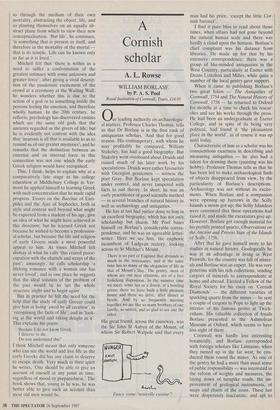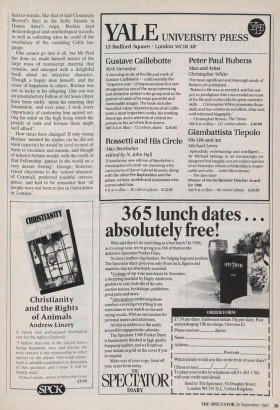A Cornish scholar
A. L. Rowse
WILLIAM BORLASE by P. A. S. Pool
Royal Institution of Cornwall, Truro, £14.95
Our leading authority on archaeologic- al matters, Professor Charles Thomas, tells us that Dr Borlase is in the first rank of antiquarian scholars. And that for good reason. His contemporary, with whom he may profitably be compared, William Stukeley, has had a good biography. But Stukeley went overboard about Druids and ruined much of his later work by his speculations. Druids were rather favourites with Georgian gentlemen — witness the poet Gray. But Borlase kept speculation under control, and never tampered with facts to suit theory. In short, he was an early practitioner of good scientific method — in several branches of natural history as well as archaeology and antiquities.
He has at last had justice done to him in an excellent biography, which has not only scholarship but charm. Mr Pool bases himself on Borlase's considerable corres- pondence, and he was an agreeable letter- writer. Here we see him, the euphoric incumbent of Ludgvan rectory, looking across to St Michael's Mount.
There is no part of England that abounds so much in the necessaries, and at the same time has so many of the elegancies of life as that of Mount's Bay. The gentry, most of whom are our near relations, are of a free frolicking disposition. In the summer time we meet, some ten or a dozen, at a bowling green; there we have built a little pleasure house and there we drive, after dinner at bowls. And by so frequently meeting together we are like so many brothers of one family, so united, and so glad to see one the other.
His great friend, across the causeway, was the Sir John St Aubyn of the Mount, of whom Sir Robert Walpole said that every Fancy some 'nouvelle cuisine'? man had his price, 'except the little Cor- nish baronet'.
I find it pure bliss to read about those times, when affairs had not gone beyond the natural human scale and there was hardly a cloud upon the horizon. Borlase's chief complaint was his distance from libraries. He made up for that by his extensive correspondence; there was a group of like-minded antiquaries in the West Country, particularly at Exeter with Deans Lyttelton and Mines, while quite a number of the local gentry gave support.
When it came to publishing Borlase's two great folios — The Antiquities of Cornwall, 1754 and The Natural History of Cornwall, 1758 — he returned to Oxford for months at a time to check his resear- ches and see his works through the press.
He had been an undergraduate at Exeter College, and in spite of its being very
political, had found it 'the pleasantest place in the world', as of course it was up until today.
Characteristic of him as a scholar was his conscientious exactness in describing and measuring antiquities — he also had a talent for drawing them (painting was his hobby). Professor Thomas tells us that he has been led to make archaeological finds of objects disappeared from view, by the particularity of Borlase's descriptions.
Archaeology was not without its excite- ments. When Borlase and a companion were opening up barrows in the Scilly Islands a storm got up; the Scilly Islanders were convinced that these operations had raised it, and made the excavators give up. However, Borlase got enough material for his prettily printed quarto, Observations on the Ancient and Present State of the Islands of Scilly, 1756.
After that he gave himself more to his studies in natural history. Geologically he was at an advantage in living in West Penwith, for the country was full of miner- als and Borlase was an expert. He was very generous with his rich collections, sending cargoes of minerals to correspondents at home and abroad. Elected a Fellow of the Royal Society for his essay on 'Cornish Diamonds' — the different varieties of sparkling quartz from the mines — he sent a couple of cargoes to Pope to light up the interior of his famous grotto at Twick- enham. His valuable collection of fossils Borlase presented to the Ashmolean Museum at Oxford, which seems to have lost sight of them.
Cornwall was hardly less interesting botanically, and Borlase corresponded with foreign scholars like Linnaeus; when they turned up in the far west, he con- ducted them round the mines. As one of the gentry he had a more than usual sense of public responsibility — was interested in the reform of weights and measures, the laying down of turnpike roads, the im- provement of geological instruments, of maps and charts of the coast. These last were desperately inaccurate, and apt to lead to wrecks, like that of half Cloudesley Shovell's fleet in the Scilly Islands in Queen Anne's reign. Borlase kept meteorological and ornithological records, as well as collecting what he could of the vocabulary of the vanishing Celtic lan- guage.
One cannot go into it all, but Mr Pool has done so, made himself master of the large mass of manuscript material that remains, and emerged with a delightful book about an attractive character. Though a happy man himself, and the cause of happiness in others, Borlase was not so lucky in his offspring. One son was an unsatisfactory Fellow of All Souls (there have been such): 'upon his entering that foundation, and ever since, I took every opportunity of cautioning him against set- ting his mind on the high living which the people of rank and fortune there might well afford'.
How times have changed! If only young Borlase 'minded his studies (as he did not want capacity) he would be level to most of them in literature and esteem, and though of inferior fortune would, with the credit of that Fellowship, appear in the world on a very decent footing'. George, however, raised objections to the 'retired situation' of Cornwall, preferred youthful extrava- gance, and had to be reminded that 'all people were not born to live in Oxfordshire or London'.































































 Previous page
Previous page